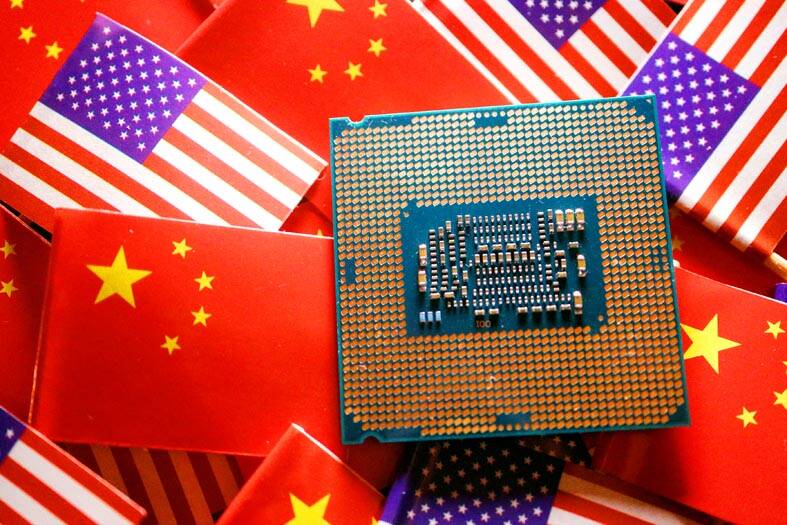China has introduced guidelines to phase out US microprocessors from Intel Corp and Advanced Micro Devices Inc (AMD) from government PCs and servers, the Financial Times reported yesterday.
The procurement guidance also seeks to sideline Microsoft Corp’s Windows operating system and foreign-made database software in favor of domestic options, the report said.
Chinese officials have begun following the guidelines, which were unveiled in December last year, the report said.

Photo: REUTERS
They order government agencies above the township level to include criteria requiring “safe and reliable” processors and operating systems when making purchases, the newspaper said.
The US has been aiming to boost domestic semiconductor output and reduce reliance on China and Taiwan with US President Joe Biden’s administration’s 2022 CHIPS and Science Act.
It is designed to bolster US semiconductors and contains financial aid for domestic production with subsidies for the production of advanced chips.
Separately, Apple Inc has discussed using Baidu Inc’s (百度) generative artificial intelligence (AI) in iPhones and other devices within China, the Wall Street Journal reported on Saturday, a potentially big win for the domestic search leader.
Apple has held initial talks about using Baidu’s generative AI technology in its gadgets, the Journal said, citing sources familiar with the matter. The US company sought a local partner because regulators there must vet all AI models, the newspaper added.
Baidu is considered one of the leaders in AI in China, where start-ups and tech giants are investing billions on developing their own answers to ChatGPT. OpenAI’s seminal creation and other foreign services are not available in China’s tightly regulated online sphere.
Apple has held discussions with Alphabet Inc’s Google and OpenAI about using their AI software on the iPhone. The company could tap multiple partners, as it does with search in its web browser.
Samsung Electronics Co, Apple’s top smartphone rival, uses Baidu as an AI provider in China for its latest Galaxy phones.
Meanwhile, South Korean chipmaker SK Hynix Inc CEO Kwak Noh-jung on Friday met with Chinese Minister of Commerce Wang Wentao (王文濤) to discuss cooperation.
Wang said he hopes SK Hynix would continue expanding investments in China as its market offers huge opportunities. Kwak said the company would keep pushing for greater development in China, which is one of its most important production bases and markets, in a statement shared yesterday.
SK Hynix is the world’s No. 2 memory chip maker after Samsung. Despite US-China technological tensions, Washington last year gave the two companies indefinite waivers to keep bringing some high-end equipment into China.
Wang also met with Apple Inc CEO Tim Cook, who unveiled plans to invest further in applied research in China. Apple gets almost 20 percent of its revenue from China and is SK Hynix’s largest customer, data compiled by Bloomberg showed.

SEMICONDUCTORS: The German laser and plasma generator company will expand its local services as its specialized offerings support Taiwan’s semiconductor industries Trumpf SE + Co KG, a global leader in supplying laser technology and plasma generators used in chip production, is expanding its investments in Taiwan in an effort to deeply integrate into the global semiconductor supply chain in the pursuit of growth. The company, headquartered in Ditzingen, Germany, has invested significantly in a newly inaugurated regional technical center for plasma generators in Taoyuan, its latest expansion in Taiwan after being engaged in various industries for more than 25 years. The center, the first of its kind Trumpf built outside Germany, aims to serve customers from Taiwan, Japan, Southeast Asia and South Korea,

Gasoline and diesel prices at domestic fuel stations are to fall NT$0.2 per liter this week, down for a second consecutive week, CPC Corp, Taiwan (台灣中油) and Formosa Petrochemical Corp (台塑石化) announced yesterday. Effective today, gasoline prices at CPC and Formosa stations are to drop to NT$26.4, NT$27.9 and NT$29.9 per liter for 92, 95 and 98-octane unleaded gasoline respectively, the companies said in separate statements. The price of premium diesel is to fall to NT$24.8 per liter at CPC stations and NT$24.6 at Formosa pumps, they said. The price adjustments came even as international crude oil prices rose last week, as traders

SIZE MATTERS: TSMC started phasing out 8-inch wafer production last year, while Samsung is more aggressively retiring 8-inch capacity, TrendForce said Chipmakers are expected to raise prices of 8-inch wafers by up to 20 percent this year on concern over supply constraints as major contract chipmakers Taiwan Semiconductor Manufacturing Co (TSMC, 台積電) and Samsung Electronics Co gradually retire less advanced wafer capacity, TrendForce Corp (集邦科技) said yesterday. It is the first significant across-the-board price hike since a global semiconductor correction in 2023, the Taipei-based market researcher said in a report. Global 8-inch wafer capacity slid 0.3 percent year-on-year last year, although 8-inch wafer prices still hovered at relatively stable levels throughout the year, TrendForce said. The downward trend is expected to continue this year,

POWERING UP: PSUs for AI servers made up about 50% of Delta’s total server PSU revenue during the first three quarters of last year, the company said Power supply and electronic components maker Delta Electronics Inc (台達電) reported record-high revenue of NT$161.61 billion (US$5.11 billion) for last quarter and said it remains positive about this quarter. Last quarter’s figure was up 7.6 percent from the previous quarter and 41.51 percent higher than a year earlier, and largely in line with Yuanta Securities Investment Consulting Co’s (元大投顧) forecast of NT$160 billion. Delta’s annual revenue last year rose 31.76 percent year-on-year to NT$554.89 billion, also a record high for the company. Its strong performance reflected continued demand for high-performance power solutions and advanced liquid-cooling products used in artificial intelligence (AI) data centers,